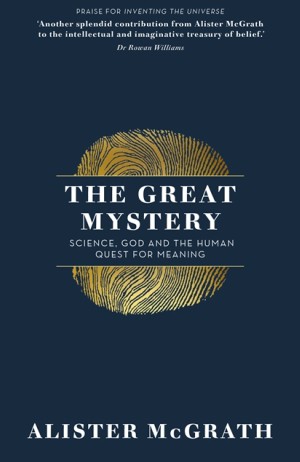The Great Mystery by Alister McGrath
Science, God and the Human Quest for Meaning - a stimulating book that will challenge Christians to think more deeply about their faith
 The Great Mystery: Science, God and the Human Quest for Meaning
The Great Mystery: Science, God and the Human Quest for Meaning
By Alister McGrath
Hodder & Stoughton
ISBN: 978-1-473-63433-6
Reviewed by: Ernest Lucas
Alister McGrath is the Andreas Idreos Professor of Science and Religion at Oxford University and a well-known writer of accessible books on science and Christianity. The book aims to draw on science and religion, which the author regards as two of the richest and most complex elements of modern culture, to explore human nature and especially the human quest for meaning in life. A particularly interesting aspect of the book is that, ‘it tries to address what is perhaps the most unsettling question of all, routinely ignored by so many smug and complacent social commentators: what is wrong with us?’ (p. 4). McGrath thinks this is important if we are not to give way to despair and cynicism in a time of crisis and disenchantment in our culture.
One reason for the current disenchantment is the erosion during the 20th century of the enlightenment’s view of human progress which became dominant in western thinking in the 19th century. Optimism grew that enhanced human wisdom and knowledge, and the technological ability to alter our environment, would ultimately triumph over evil. Little thought was given to the Christian insight that humanity might be an agent of evil, and not merely its victim.
McGrath points out a conundrum facing secular humanists but which is ignored by most of them, including the ‘New Atheists’. They argue that just about everything that is wrong with the world can be blamed on God and religion. But, if as they claim, God is simply an invention of deluded human minds, it is human nature that must be blamed as the source of evil in the world. How can humans be ‘reshaped’ to deal with this problem? McGrath describes and critiques some current secular attempts to answer that question and shows that the Christian answer is still worth consideration.
This is only one aspect of his rich discussion of human nature and the quest for meaning. In this discussion he engages in a respectful way with many key thinkers, past and present. He offers no easy answers but shows what Christian thinkers have to offer to the discussion. One strength of his discussion is the recognition that it cannot remain simply at the level of ‘objective facts’. Human nature is complex and human experience includes a great deal of ‘subjectivity’. Therefore he draws on the results of psychological studies of what contributes to human flourishing and well-being.
Christians will find this book stimulating and one that will challenge them to think more deeply about their faith. It is one that can be lent to non-Christians to challenge them, too, to deeper thought about their beliefs and to introduce them to some Christian thinking. It could be the basis for a ‘seekers’ discussion group.
The Revd Dr Ernest Lucas is Vice-Principal Emeritus of Bristol Baptist College and has doctorates in both science and biblical studies
Baptist Times, 16/11/2018